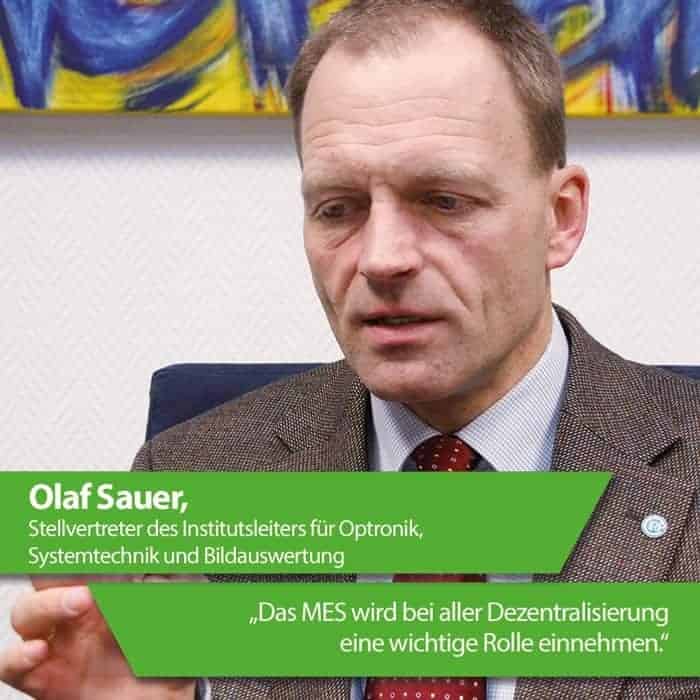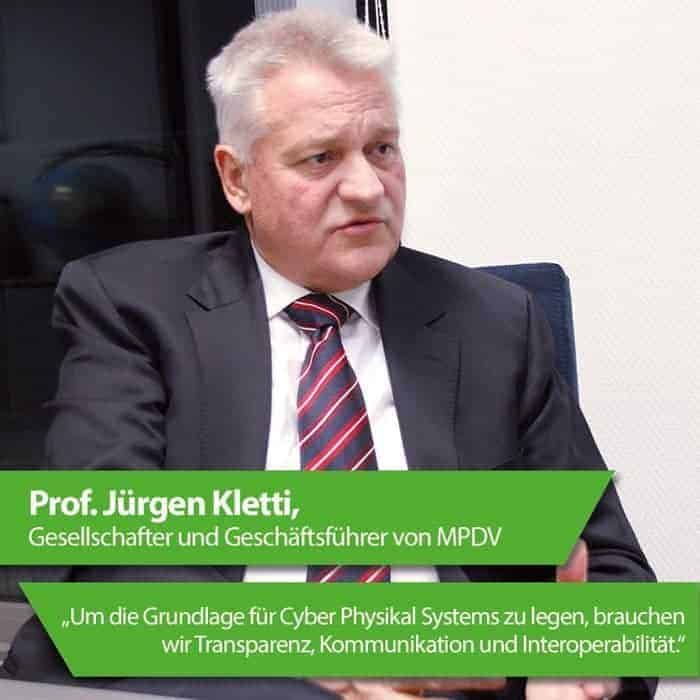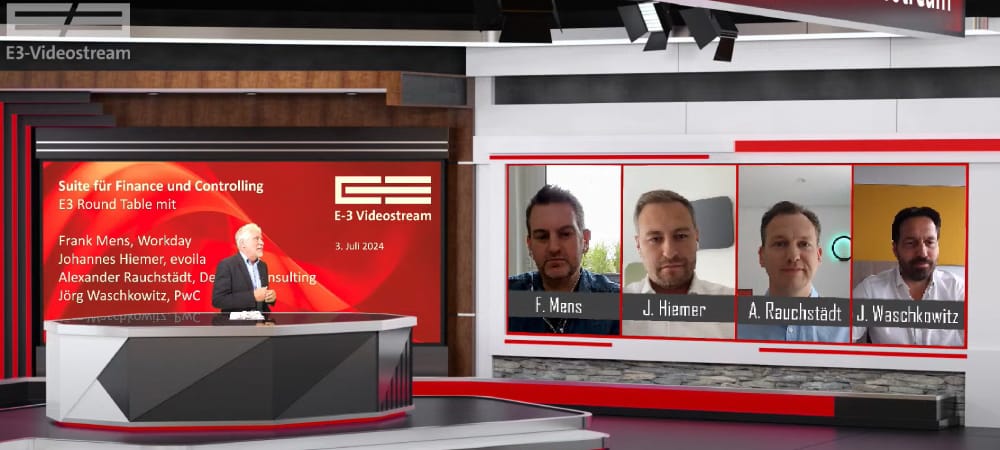Industry 4.0 needs MES systems


Jürgen Kletti: The topic of Industry 4.0 has become so big that it is no longer just the manufacturing-related trade media that report on it. To what extent does this topic affect the MES market?
Olaf Sauer: Manufaction Execution Systems will play a central role in Industrie 4.0. But let's start at the beginning and discuss how this topic came about.
Based on a study by the BMBF, Prof. Manfred Broy defined the term Cyber Physical Systems (CPS). Drivers for CPS should be four fields: Mobility, Health, Energy and Production. The field of production, which is of interest to us, was relatively soon strikingly renamed "the fourth industrial revolution.
To make it shorter and more concise, from now on the topic was called "Industry 4.0". But now back to our topic: In itself, there are already many approaches to Industry 4.0.
We now have to align the topics and derive activities from them. MES are important key components in modern production - the information hub, so to speak.
Kletti: This is also how we understand it. Communication - both vertically from the ERP to the automation level and horizontally between the areas of production, logistics, personnel and quality - is already handled by the MES in the form of integration.
In my opinion, the resulting transparency in production is an important basis, if not the driver, for Industry 4.0. It is not far from real-time communication to intelligent workpieces.
The first signs of this can already be seen in the automotive industry. MES is already a first step toward decentralization. All work steps are no longer planned in the work preparation department, but at various locations - and this is done on the basis of data that is recorded and aggregated across the entire production process.
Sour: However, interoperability and end-to-end intelligent communication are important here. This requires standardization of communication between the individual plant components, machines, material flow systems, workpieces and other systems.
We have already made some progress here, but it can go further faster and with broader participation. To this end, system manufacturers must recognize that proprietary protocols and interfaces have long-term disadvantages compared to open standards.

Kletti: Our approach with UMCM (editor's note: Universal Machine Connectivity for MES) is already moving in the direction of standardized communication. Similar to USB, this should make it possible to connect machines to an MES in a simple and uncomplicated way - quasi plug & work.
Sour: And this is precisely what strengthens the role of the MES as an information hub. This is where all the data comes together and is condensed. Despite all sensible decentralization, for cost reasons it makes sense to operate MES as a central instance, for example in the cloud, and to make the MES functions available as services.
Kletti: In addition, individual components must be brought together somewhere to form an assembly. A superordinate instance is needed to ensure synchronization. Especially at the borders of a company, for example at the interface to the upstream supplier, it is important that relevant data is stored and transferred centrally.
Sour: That's right, anarchy must not prevail in a decentrally organized system. There must be an authority that provides rules and can also assume responsibility or intervene if the autonomously acting workpieces do not find a solution to conflicts. The MES will therefore play a central role despite all decentralization.
Kletti: Let us construct a thought structure for once: To lay the foundation for Cyber Physical Systems, we need transparency, communication and interoperability. An MES provides all this through vertical and horizontal integration. Thus, the MES is already the first step towards Industry 4.0.
Sour: I see it that way, too. Now we just have to make sure that everyone gets exactly the information they need. It doesn't help anyone if they are flooded with a vast amount of information. And I'm talking here about people as well as machines or workpieces. Some kind of role-based information presentation is probably indispensable here.
Kletti: VDI 5600 describes precisely this in terms of the central tasks of an MES. Horizontal integration, i.e. the direct and immediate exchange of data between the individual applications from the areas of production, personnel and quality, can only take place via a central database.
Otherwise, the requirement for real-time capability would not be sufficiently ensured. The availability of meaningful and promptly calculated key figures is enormously important for comprehensive production management.
This cannot be achieved with vertical stand-alone solutions. The HYDRA example shows nicely how the individual modules fulfill the tasks of VDI 5600 and interlock with each other.
The "MES Compendium" has also recently been published by Springer Vieweg Verlag. In it, the right way is described in a practical manner for the individual modules. Meaningful key figures can then be calculated in real time from the central database in the MES, which can be used to make important decisions in the production process.

Sour: As the use of mobile devices increases, so does the desire to access production data from anywhere. Of course, it is a challenge to display the data on any device in such a way that it can be worked with. This is where MES systems will have to prove their flexibility in the future.
Kletti: In this regard, we are already working on concepts for the universal use of all types of end devices. Our goal is to present the requested data to the user in the appropriate form on each device.
The focus here is also on the use of different devices for data acquisition. Central data management is thus an important component that ensures the real-time capability of an MES. And this is exactly why MES is an important element for Industry 4.0.
Sour: And in the course of the constant virtualization of computing power and services, the service-oriented approach is becoming increasingly important. At some point, we will no longer care where the data and services come from.
It will only be important that the information is available reliably and in real time so that we can respond appropriately and promptly as needed. Despite all the visions - in case of doubt, however, humans should always retain the final decision, no matter how intelligent the systems in production become.
Kletti: I absolutely agree with you there. Thank you very much for the interesting conversation.




